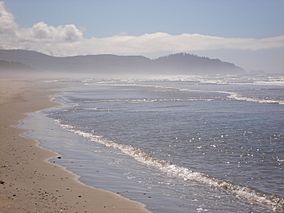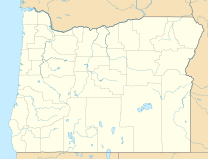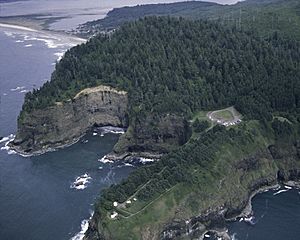Cape Meares National Wildlife Refuge facts for kids
Quick facts for kids Cape Meares National Wildlife Refuge |
|
|---|---|
|
IUCN Category IV (Habitat/Species Management Area)
|
|

Cape Meares as seen from nearby beach
|
|
| Location | Tillamook County, Oregon, USA |
| Nearest city | Cape Meares |
| Area | 138.51 acres (56 ha) |
| Established | 1938 |
| Governing body | U.S. Fish and Wildlife Service |
| Website | Cape Meares NWR |
The Cape Meares National Wildlife Refuge is a special place on the Oregon Coast. It is one of six wildlife refuges in the Oregon Coast National Wildlife Refuge Complex. A wildlife refuge is an area set aside to protect wild animals and their homes.
This refuge was created in 1938. Its main goal is to protect old, tall trees called an old-growth forest. It also protects the areas where seabirds come to have their babies.
Many amazing birds live here. One is the marbled murrelet, a bird that needs special protection. Peregrine falcons, which were once very rare, have also made their nests here since 1987. Most of the refuge is a Research Natural Area. This means it is kept very natural for scientific study.
You can also visit the Cape Meares Light. This old lighthouse helped ships find their way from 1890 to 1963. From Cape Meares, you can see two other wildlife refuges: Three Arch Rocks National Wildlife Refuge and Oregon Islands National Wildlife Refuge. It is the only spot in the United States where you can see three refuges at once!
Contents
Discover Amazing Wildlife
The Oregon Coast Trail goes right through the middle of Cape Meares. Along the trail, signs explain all about the different animals you might see. It is a great place to learn about nature.
Spotting Ocean Animals
From the trail, you might spot gray whales swimming by. They are often migrating, which means they are traveling long distances. You can also see different kinds of sea ducks like scoters. Look for western grebes and common loons too.
There is a special viewing deck at the Cape Meares State Scenic Viewpoint. From here, you get amazing views of the cliffs and islands. You might even see the nest of a peregrine falcon pair. A bird's nest on a cliff is called an aerie.
Birds of the Cliffs
Every spring, thousands of seabirds return to the cliffs to nest. It is a busy and noisy time! You can see many different species. Some common birds include brants, pelagic cormorants, and common murres. Look for the colorful tufted puffins and pigeon guillemots. You might also spot western gulls and black oystercatchers.
The state park has about 3 miles (4.8 km) of hiking trails. There is also a 1-mile (1.6 km) walking trail through the forest. This forest is filled with huge sitka spruce and western hemlock trees.
Meet the Cape Meares Giant Tree
Some of the trees in the refuge are incredibly old. They are hundreds of years old and stand over 200 feet (61 m) tall! One tree is especially famous: the Cape Meares Giant. It is a massive Sitka spruce.
After a big storm in 2007, another giant spruce tree was damaged. So, experts were allowed to climb and measure the Cape Meares Giant. In 2008, the U.S. Fish and Wildlife Service announced something exciting. They said the Cape Meares Giant is the largest known Sitka spruce in Oregon. It was even named an Oregon Heritage Tree. This means it is a very important and historic tree for the state.
 | Roy Wilkins |
 | John Lewis |
 | Linda Carol Brown |



